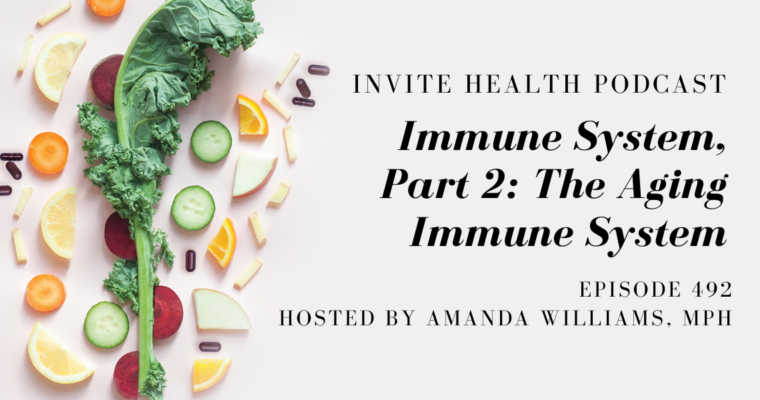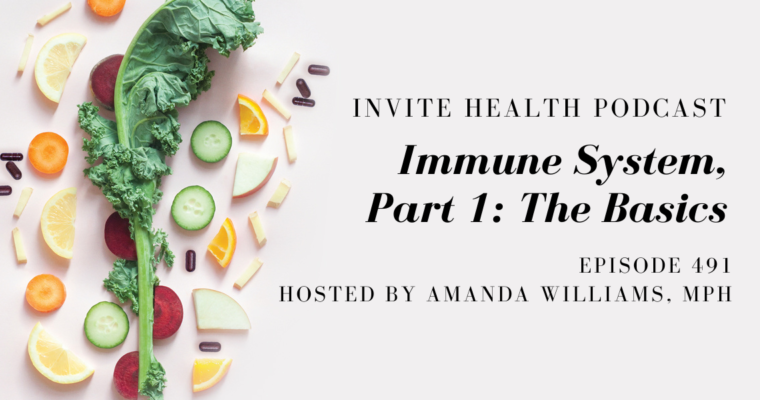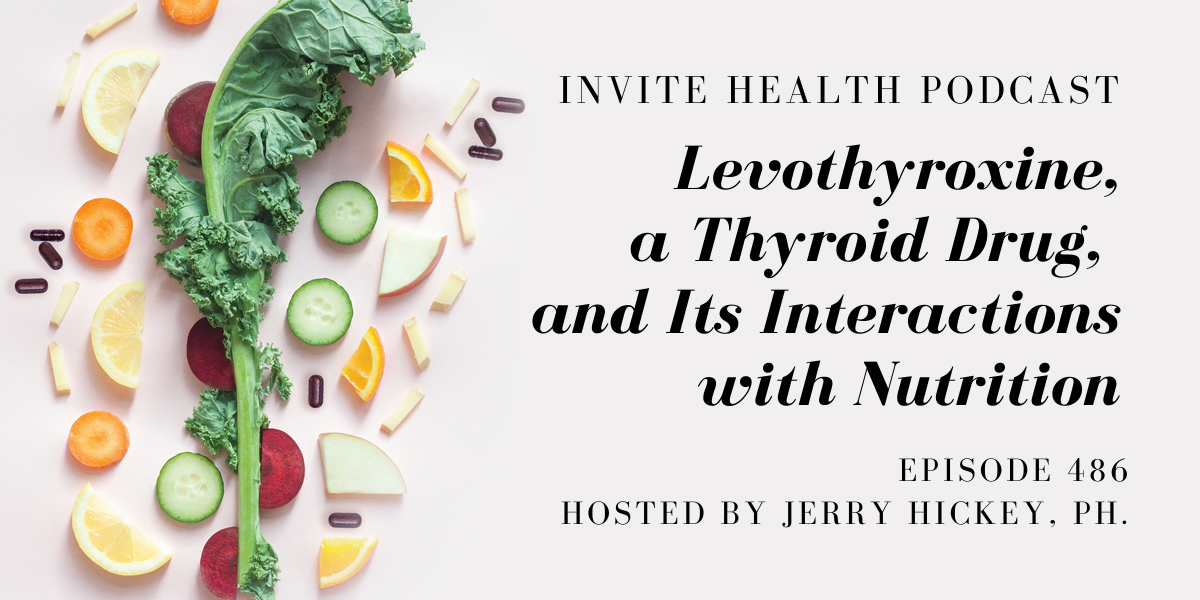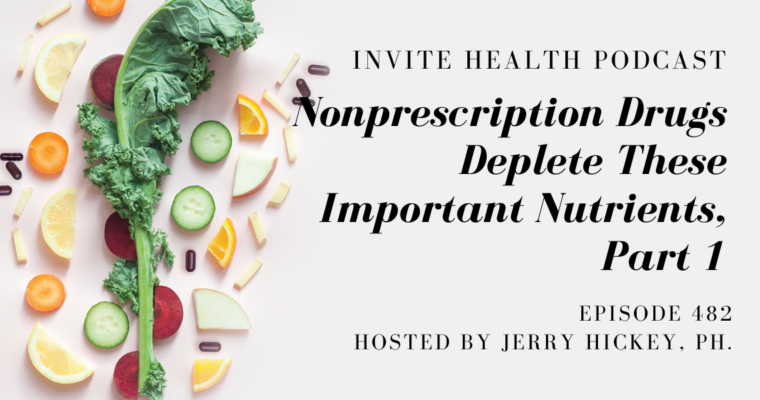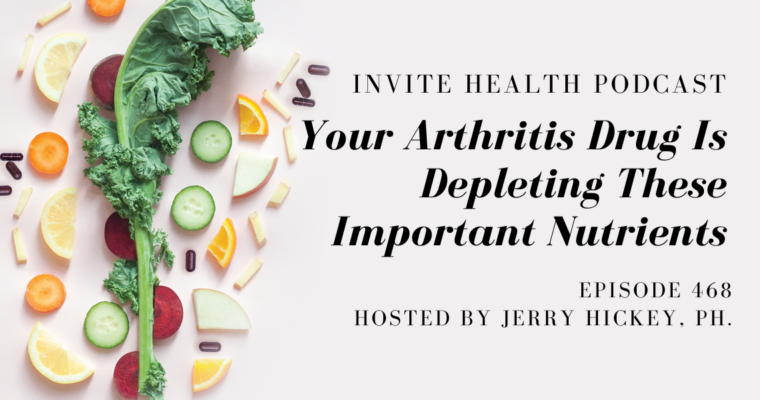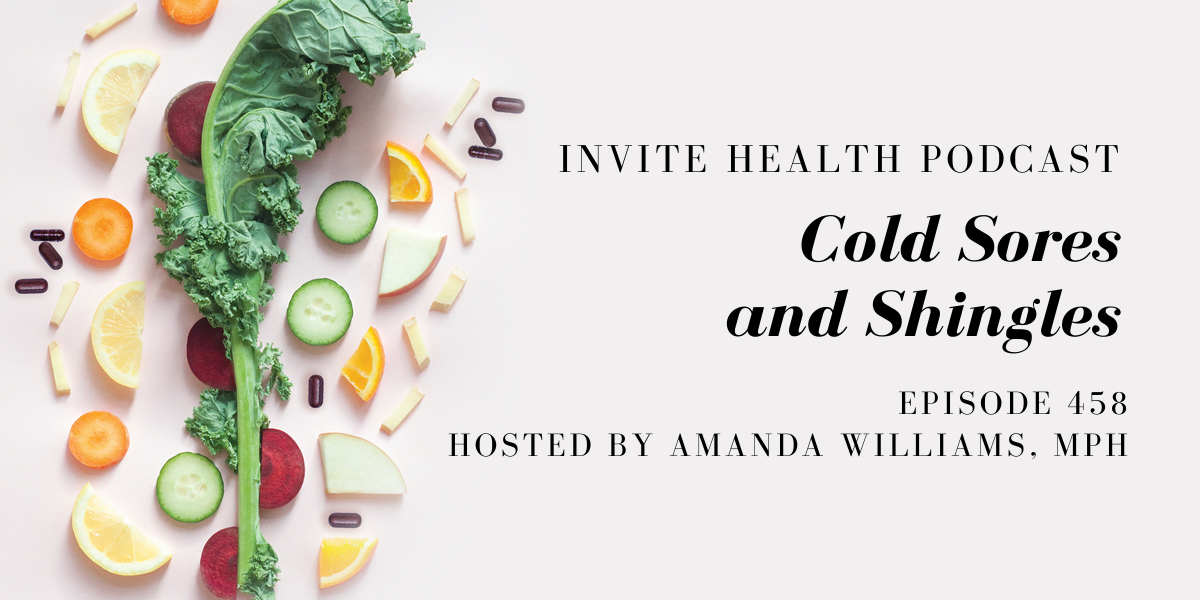thyroid
Subscribe Today!
Please see below for a complete transcript of this episode.
Levothyroxine, a Thyroid Drug, and Its Interactions with Nutrition – InViteⓇ Health Podcast, Episode 486
Hosted by Jerry Hickey, Ph.
*Intro music*
InVite Health Podcast Intro: Welcome to the InViteⓇ Health Podcast, where our degreed healthcare professionals are excited to offer you the most important health and wellness information you need to make informed choices about your health. You can learn more about the products discussed in each of these episodes and all that InViteⓇ Health has to offer at www.invitehealth.com/podcast. First time customers can use promo code PODCAST at checkout for an additional 15% off your first purchase. Let’s get started!
*Intro music*
Jerry Hickey, Ph.: Your thyroid is a gland that releases thyroid hormones and when it’s not working well, which is pretty common… When it under functions, which is called hypothyroidism, you could feel very fatigued. It might be hard to focus. You pretty much feel miserable. So where is your thyroid gland and what does it do? A gland releases hormones. Hormones are kind of messengers that travel throughout the entire body, and they knock on the door of every cell and the cells that need it allow it to come in. So your thyroid affects literally every cell in the body. It stores and releases several thyroid hormones and conditions that affect the thyroid are very common, especially under function. But more on these thyroid hormones later, I’ll explain what they do.†
Now, the thyroid hormones in general are essential for the function of every cell in your body. They help regulate growth, including muscle development. For children, they need it for growth, and they need it for brain function. They’re needed for the rate of all the chemical reactions that take place in your body every second, all those tens of thousands of reactions. That’s called metabolism. Now your thyroid hormone’s needed for brain function. So if the levels are low, that leads to feelings of stress or anxiety or even depression. Commonly, these people experience brain fatigue. That could be accompanied by nervousness and brain fog, or even an inability to concentrate and carry on a good conversation. If it’s really advanced, low thyroid function, which is called hypothyroidism, I’ll repeat that a couple of times throughout the conversation here. Thyroid hormones affect our heart rate. In fact, sometimes when you got a prescription drug of thyroid hormone that could make your heart race like levothyroxine, which is also called Synthroid. So it’s always good when you first get a thyroid hormone to underestimate the dose, to start at a lower dose than the doctor thinks you need and this way, you don’t get side effects and the body can kind of adapt to the thyroid hormone.†
So people with an overactive thyroid, which is not very common, that’s called hyperthyroid, overactive thyroid. Their heart races, they burn all the fat in their body. They burn all their muscle, they lose bone. They’re very anxious and nervous. They’re very overactive. Their eyes can bulge out. That’s called ophthalmos. Too much thyroid hormone, like I said, can make your heart race, but it can also affect your blood pressure. Now it does affect your, your body temperature. So if you’re low in thyroid hormone, you could feel really cold in the winter. Thyroid hormone’s very important for metabolism, a major part of metabolism is converting food into energy. So if your thyroid is under functioning, you can feel really fatigued.†
HOW VITAMIN A BENEFITS IMMUNITY AND VISION – INVITE HEALTH PODCAST, EPISODE 197. Listen Now>>
So where’s it located? It’s located in the lower part of your neck. So in a man, it would be just below the Adam’s apple. It wraps around your trachea. Your trachea is the pipe from your nose and mouth to your lungs, so it’s called your windpipe. The thyroid wraps around the trachea. It kind of has a butterfly shape, so it has two wings, one on each side of the trachea, they’re called lobes, and they’re attached in the middle part by something called an isthmus.†
So today we’re going to discuss Synthroid. It’s also known as levothyroxine or T4. This drug is very commonly prescribed. It’s always among the top five prescribed drugs in the United States and worldwide. Millions and millions and millions and millions and millions of people are on it. They use it for treating hypothyroidism. So hi, my name is Jerry Hickey. I’m a nutritional pharmacist. I’m also the Senior Scientific Officer over here at InViteⓇ Health and welcome to my episode: Levothyroxine, a Thyroid Drug, and Its Interaction with Nutrition. Thanks for tuning into today’s InViteⓇ Health Podcast episode. You can find all of these episodes for free wherever you listen to a podcast, or just visit invitehealth.com/podcast. Please subscribe and leave us a review. You can also follow us on Facebook (I think that’s called Metaverse today), Twitter, Instagram @invitehealth, and the information on this episode is linked at the episode description, so I really want to get going here.†
Well over 30 million people suffer from a thyroid condition called hypothyroidism. That’s in the United States. It’s under functioning of your thyroid gland. So it happens when your thyroid doesn’t produce enough thyroid hormone. It’s pretty common and it becomes more common with age. It leads to a slowing down of metabolism. You get fatigued, brain fog, dry skin, weight gain, problems with the heart, inflammation, elevated cholesterol, digestive tract issues, nervousness and more. I mean, it’s very common for people to have some depression, moodiness, forgetfulness, poor concentration. Some people get goiter. The thyroid in the neck enlarges and they have like a swollen thing in their neck. They can develop brittle nails, brittle hair. In fact, they can suffer with hair loss. Their face gets puffy. They can have a slowed down heart rate because you need thyroid hormones for the rate of your heartbeat. They can have problems like diarrhea and constipation. Their cholesterol goes up. The good cholesterol goes down and the bad cholesterol goes up. It can affect fertility. It can affect women’s menstrual cycles if they’re younger. But you have a loss of energy, persistent fatigue, cold sensitivity, like it’s cold outside, you really feel it. Your joints can ache. You can have muscle cramps and stiffness. A lot of stuff. Dry, itchy skin. Just a lot of things. †
So a lot of people think metabolism is just how fast they burn calories, because that’s, you know, that’s what the weight loss companies tell you. Metabolism. It’s all about burning calories. No, no. That’s a vast oversimplification of the term. Metabolism is sustaining your life. It’s a life-sustaining process. It involves all of the different chemical reactions that take place in your cells every second. Tens of thousands of them are going on right now. So it maintains your ability to live. So death is a lack of metabolism. I mean, that’s really the definition of death. So thyroid is needed for metabolism.†

Now, the number one thyroid drug is called Synthroid, but it’s widely available as a generic, which is called levothyroxine, which is T4. So let me tell you the various thyroid hormones. Your thyroid generally releases two hormones: T4, which is the levothyroxine also called Synthroid, and T3, and it releases mostly T4 with a little T3. The thing is, T4 is not that active. It’s really the T3 that does the job. So you get a little T3 so you have instant energy and instant metabolism and slowly but surely, the T4 is converted into the active form in like your liver and your muscles, etc. So T4 is supposed to convert to T3, and then it works. When you get Synthroid (levothyroxine), it’s only T4. That doesn’t work in everybody. Some people have trouble converting that to T3. They could get a second hormone called Cytomel, which is also called liothyronine. You get a low dose of that. That’s actually active T3. You see that more in people with Celtic background and Irish backgrounds, where they have an inability to convert T4 to T3 adequately, so they seem to have a little bit of ADHD kind of thing going on. So they actually… they actually might do a lot better with a different thyroid called Armour Thyroid, which is a natural thyroid. It’s a prescription, but you get the thyroid combination released from your own thyroid. You get the T4 and T3, so a lot of people do better on the Armour Thyroid than they do on the levothyroxine.†
There’s another hormone called TSH, and that’s very useful for diagnosing problems with the thyroid. So normally there’s a certain amount of T3 and T4 in your blood. There’s like a normal range, and when there’s not enough, the brain makes note of this and it releases TSH to push the thyroid to work harder. So you really shouldn’t see much TSH in the blood. So even if your level is high, but it’s on the high end of normal, excuse me. But even if your level of TSH is normal, let’s say again, even if your TSH is normal, but it’s kind of like in the high end of normal, that might be an indication that you have a sluggish thyroid. So TSH is released from the brain when the thyroid is not producing adequate amounts of thyroid hormones, so it’s really pushing the thyroid to work. It stands for thyroid stimulating hormone. So when you see low levels, that means the thyroid is probably over functioning and when you see high levels, that means the thyroid is under functioning.†
Now, when you take Synthroid, levothyroxine, T4, they’re all the same thing, it lasts all day long. It has a very long half-life. You have to take it away from everything. So I told people who take it like, take it a couple of hours before your breakfast, take it a couple of hours before your multivitamin. You don’t want to take any minerals with it because thyroid hormone is essentially made out of an amino acid that comes out of a protein called tyrosine and iodine. And if you get a lot of minerals, like divalent minerals like potassium, magnesium, calcium, etc., they’re going to attach to the thyroid hormone. They’re going to attach to the iodine and the drug won’t work. So that’s why we don’t like you to take anything when you’re taking thyroid hormone, we like you to wait a couple of hours. Now you have to avoid these almost universally.†
So this is important: If you’re on thyroid medication, you have to avoid these things. Seaweed. Seaweed is loaded with iodine. There’s been reports for many years of people with normal thyroid function, snacking on chips made out of seaweed, who develop an overactive thyroid. So you don’t want to have the seaweed chips if you’re on a thyroid medication. And even if you have normal thyroid function, you don’t want to overdo seaweed. Now, another name for seaweed is bladderwrack, so you want to stay away from bladderwrack. You’ll be getting too much iodine. And you don’t want to take kelp because that’s also iodine. But here’s the thing. Part of your thyroid is still working, so it still needs to be nourished. So you do want to get some iodine. We’ll address that in a minute.†
So if you’re on a thyroid medication, you really want to avoid the next two herbs. Ashwagandha root. Everybody is going crazy today with ashwagandha. Ashwagandha increases thyroid function. If you’re on thyroid medication, that could be potentially dangerous but also Coleus forskohlii. That’s another herb that affects the thyroid. So if you’re on thyroid medication, you don’t want to have seaweed. You don’t want to have Coleus forskholii. You don’t want to have ashwagandha root. You don’t want to have a lot of iodine. You also don’t want to take your thyroid with food or with other supplements. You want to take it at least two hours before.†
Now, we all still need some iodine, even if we’re on thyroid medication. See, I always tell people, think of the thyroid as an apple pie with different slices and people with an under functioning thyroid, they still have some of that pie. They still have some slices. They’re just missing some slices. So they give you the amount of thyroid appropriate to make out for the percentage of thyroid functioning you’re lacking. So they’re not replacing your entire thyroid hormone release. You’re still releasing some thyroid hormone unless you’ve had your thyroid surgically removed or destroyed by radioactive iodine. So you still need some iodine, but get it from your multivitamin, typically they give enough iodine for people that it won’t interact with their thyroid medication.†
ALARMING FINDINGS ON NUTRIENT DEFICIENCIES – INVITE HEALTH PODCAST, EPISODE 303. Listen Now>>
Now let me give you another tip. If you’re put on levothyroxine and it’s making your heart race, tell the doctor because they should lower the dosage, but take a supplement called L-carnitine. Everybody thinks L-carnitine increases energy. It’s a lot more complex than that. L-carnitine is an energy regulator, so if you’re fatigued, it brings up your energy. But if you’re hyperactive or your metabolism is racing, it brings down your energy. So if you took too much levothyroxine and your heart’s racing and you feel all nervous and all, and this becomes a problem, you might want to try some L-carnitine. Now, even though you’re on thyroid medication, the remaining part of your still-functioning thyroid needs to be nourished, so you do need some iodine. About 150 micrograms a day is plenty.
You still need selenium. Selenium converts T4 to T3. So if you’re taking Synthroid, levothyroxine, it’s T4, you need to be able to convert it to T3 for it to function. The body requires selenium to accomplish that. But the body also requires zinc and Vitamin A to accomplish that. So a lot of these things could be found in a multivitamin, the iodine, the selenium, the zinc, the Vitamin A. So T4 is not very active, that’s the Synthroid, the levothyroxine prescription. You have to change that into T3 for it to work. It’s much more active. You require selenium, zinc and Vitamin A to achieve that. You also should use some Vitamin D because Vitamin D helps prevent your thyroid from becoming further inflamed. You need some iron. Iron blocks reverse T3. Reverse T3… If the doctor looks in your blood, your thyroid hormone levels might be normal, but if you have a lot of reverse T3, that’s blocking the thyroid hormones from working. So if you have sufficient iron in your blood, that blocks reverse T3 and it allows your thyroid hormones to work.†
You need protein to get tyrosine to make thyroid hormone. That’s how it works. It’s attached to iodine. So T4, which is levothyroxine, which is Synthroid, is a chain of four molecules of iodine attached to tyrosine. For it to become active, it has to become T3, which is a chain of three molecules of iodine attached to tyrosine. So you need to eat some protein to get the tyrosine. You also need B-vitamins. There’s eight B-vitamins because you need them to utilize the energy that the thyroid hormone is going to release properly.†
So I hope I’ve been some help here. Nutrition is important for your thyroid, even if you’re on thyroid hormone because there is some thyroid function remaining and that has to be nourished. I want to thank you for listening to today’s episode. You could find all of our episodes for free wherever you listen or just visit invitehealth.com/podcast. Please subscribe and leave us a review. You can also follow us on Facebook, Twitter and Instagram @invitehealth. I hope to see you next time on another episode of the InViteⓇ Health Podcast, and thank you so much for listening. Jerry Hickey signing off. †
*Exit music*


